Below we publish an article by Malcolm James* on a visit he paid to Chios in Greece and what he witnessed while volunteering in early 2016 and the contradictions between caring for refugees and the cruelty meted out to them.
There must now be very few people in Europe unaware of the ‘refugee crisis’. Certainly, the accompanying state cruelty has never been far from the headlines. Borders have closed across Europe, and Denmark has confiscated migrants’ gold. There has been violence against refugees in Hungary, Calais and on the Greek-Macedonian border. An EU-Turkey deal has been penned and UN asylum conventions are being re-interpreted on the ground. And of course Britain has refused to offer anything but the most minimal sanctuary to people it has helped displace. And all of this has happened since the end of 2015.
‘Crisis’ implies novelty or brevity but what is happening is neither new nor will end soon. What has caught Europe’s attention since end of 2015 is the latest phase of ongoing, and forced, human displacement. Today the conflicts in Syria, Iraq and Afghanistan continue to drive people to Greece and Italy. On the edges of Europe, other refugees join them from the wars in Ukraine, Somalia, and global capitalism.
Prior to the end of 2015 many in Europe had not heard of Chios. But from October 2015, it became synonymous with the ‘refugee crisis’ as hundreds arrived on its shores. This essay attempts to understand the everyday practices of cruelty and kindness in this location, and to make sense of what they mean.
Cruelties in this essay refer mainly to the bureaucracies, practices and legal frameworks of FRONTEX, the Greek police, non-governmental organisations.[1] Care refers to person-to-person acts of empathy, responsibility and relation practiced by independent volunteers and forcibly displaced people.[2]
While cruelty and care have often viewed in abstract philosophical terms, or placed in simple opposition – the one providing an antidote to the other – in this essay I discuss how they unfolded together. I contend that, in the context of the refuge crisis, it is vital we understand how these practices work and that we develop an ethics and politics of care accordingly.
Crossings
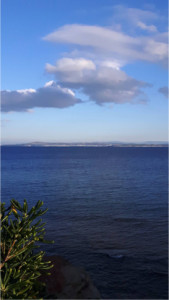
When my partner, Nicole and I arrived in Chios airport at the end of January 2016, the welcoming of refugees was well underway. For the last four months people had arrived daily in their hundreds. Our flight from Athens was of absurd ease compared to the 13km crossing of the Aegean many migrants had already undertaken. For months, departing from the Turkish port of Çeşme, rubber boats carrying up to seventy people had been propelled by five horsepower motors across a dangerous sea. That combination of overloaded boats, weak motors, waves and wind was deadly, and after a few days more than 200 people had drowned – a tiny fraction of the total dead which is now in its tens of thousands.
Crossing in these unsuitable crafts, the rhythms of arrivals were governed by the weather. When the sea was rough, as it was when we arrived, people waited in camps around Çeşme. When the sea was calm between 300 and 1,200 people arrived a day – stopping for two days in Chios before heading across Greece, through the Balkans and on to Germany. These people were of different nationalities, ages and genders – Syrians, Iraqis, Afghanis, some Iranians and Iraqi Kurds. All were cold, wet, hungry and tired. Some were scared, others relieved to have landed.
———
As the boats started arriving in October 2015, the locally formed Chios Solidarity Collective met the refugees. The Collective helped the travellers from the sea and organised an initial supply of clothes. Food was provided from a World War II army soup canteen, and then from a kitchen able to serve 200-300 people twice a day.
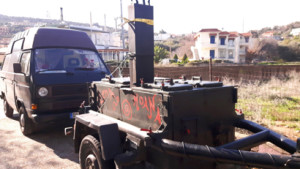
This was supplemented by a regular breakfast of porridge given by the Swiss Anarchists, who had set up a squat on the port wall. For the islanders, this care became a full-time occupation superseding their preparation for the pending tourist season.
Splinters of history
Landing on the coast, the humanity and infra-humanity of the refugees was made sense of in a particular historical context.
As a local wholesaler explained, since the 1923 population exchange convention between Greece and Turkey, Islanders had acted with care towards refugees. At the end of WWI, the Convention had relocated Muslim Greeks to Turkey and Turkish Orthodox Greeks to Greece – separating families and friendships along ethnic lines. 40,000 of these refugees were Anatolian Greeks who also left Çeşme for Chios (using the same routes as refugees today). Nearly a century ago, they also established themselves behind the old castle walls – the location of today’s UNHCR main camp, Souda.
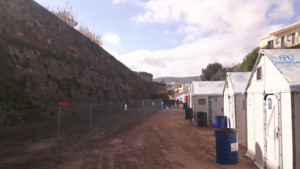
The wholesaler, like many others, was a descendant of these refugees. His family history, the sea, and the architecture of the city, then helped him trace a narrative of care for the new arrivals.
However, these narratives of care were interwoven with stories of tragedy in which the refugees figured. In 1881, Chios suffered a destructive earthquake – part of a local telling of loss on the island which also included 500 years of Ottoman rule, a much discussed but so far hypothetical Turkish naval invasion, and the current ‘refugee crisis’.
These narratives fed national and racial myths, which divided ‘them’ from ‘us’ – the Ottoman barbarians who usurped the Greeks’ civilisation; and in the context of the ‘war on terror’, the refugees from the Muslim East who threatened the Greek way of life.
Indeed this racialised threat informed concerns for the declining tourist economy. Key to the economic viability of the island, and battered by Euro-zone austerity and poor international press, the tourist industry was on its uppers. The refugees, with their spoiling of the beaches and pollution of the town, became the scapegoats for an island economy in decline. This, of course, obfuscated the relation between enforced neoliberal hardship in Greece and war in other countries.
Boats and beaches
In the everyday actions on the island cruelty and care were also intertwined. Coastal rescue, the registration centre, food provision and the registering of volunteers provided different sites and practices through which these tensions could be understood.
Coastal rescue on Chios has been devolved to the Beach Team which has lookouts at strategic points on the coast and lit safe landing areas (such as beaches) with cars’ headlights to help refugees avoid the rocks. When the boats got close enough, volunteers would wade into the water and help people ashore. The volunteers worked to ensure that those lives, which they valued, could be saved.
This practice was in tension with FRONTEX and the Greek police who designated the people in the boats in a very different way. Responding to the make-do efforts of the volunteers, these state agents banned the use of car headlights from the coast, effectively ushering hundreds of people to the rocks, and potentially their deaths. They ordered volunteers not to call to boats to guide then in, and not to enter the sea to help people. This was enforced by coastal patrols, and through the threat of prosecution, firstly under smuggling legislation, and then under human trafficking legislation that in a perverse irony contains a charge of cruelty to other humans.
Registration centre
On the coast, the visceral reality of life and death clarified what was at stake in the struggle between care and cruelty. However, on the rest of the island the relative banality of routines, and the absence of ethical and political frameworks for action, made the distinction between cruelty and care less easy to define.
From the seashore and cliff walls, the travellers from Turkey made a short journey to the registration centre, Tabakika, housed in an abandoned leather factory. It had been set up by UNHCR at the end of 2015 and was run by the Norwegian Refugee Council.
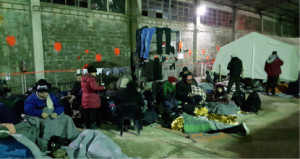
In December 2016, patio heaters were installed and the broken windows covered with plastic sheeting to reduce the draughts. With sleeping bags or foil sheets, rest was possible and the heaters allowed new arrivals to dry their clothes and family photos. Up and down its football-pitch length, numerous acts of care were evident.
Volunteers staffed the inappropriately named ‘boutique’ – a plywood cubicle in the registration centre that functioned as both repository and distribution point for donated clothes. It was here that hundreds of people a day were given warm jackets, head scarves, new shoes and underwear to continue their journey through Greece and into the freezing Balkans. It was from here that volunteers massaged the feet of a small child, swollen by cold, dug through tens of unopened boxes to find one more pair of men’s shoes, talked to people, gave milk to babies, and visited the hospitals to check on the injured and ill.
The refugees also cared for each other. Two Syrian men, previously strangers, helped each other find shoes and clothes. Information, sent backward and forwards by mobile phone, was pooled on border crossings and routes, and limited space around heaters shared. Money was collected and given to a Syrian family that had been robbed. Refugees acted as interpreters for each other, and in one case, a Syrian woman called Amena spent a whole day and night translating for others so that they could get the clothing they needed.
Existing in close proximity to these forms of care was cruelty. The movement of refugees through the camps was managed by wristbands marked to denote whether they had registered; received clothes and a sleeping bag; and, when they should move to the main camp.[3]
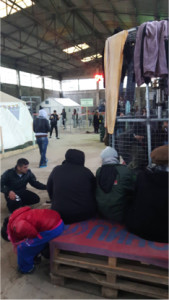
In Chios again, it was a racialised registration system, the reduction of humans, to infra-humans, to categories, for management, which made other cruelties possible.
On their first evening in the registration centre, refugees were offered either foil blankets or sleeping bags, the choice marked on their wristbands. Many took the former, before realising sleeping bags were better for the low night temperatures. They then asked to swap. These were cold, tired people. They had been wet and scared. They were not allowed to swap. Left to endure a night at just above zero degrees centigrade, the accountancy system, which did not treat them as humans, meant that their mistake was irreversible.
Sharing food
Largely independent of this bureaucracy was the food preparation and distribution infrastructure – the People’s Street Kitchen, the Swiss Anarchist kitchen, and the Greek Solidarity Kitchen.
We volunteered at the People’s Street Kitchen. Here preparation and distribution was self-organised, relatively leaderless in structure and resourced by personal donations of money and time. This organisation meant that it was fluid and resilient. Although food distribution had to be notified to the NGOs running the camps and registration centre (Samaritan’s Purse and Norwegian Refugee Council), it existed largely outside the bureaucracy of the state and NGO hierarchies.
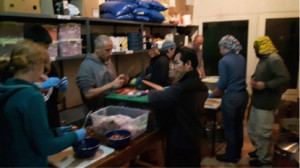
Initially, food was distributed to refugees from the backs of individuals’ cars. Sharing and enjoying food in this way was an act of humanity between volunteers and refugees. It demonstrated solidarity against the cruelties surrounding those moments. This solidarity was communicated through kind gestures, touching the hand to the heart, slight embraces and kind scraps of English, Arabic and Persian.
The Greek police saw this as a threat and worked to ensure that those involved were intimidated. Acts of intimidation included banning food from certain sites and preventing the distribution of soup within the camps. This latter regulation, which moved the distribution of soup to the parking areas, had the effect of denying the elderly, babies, infants, the unwell or disabled, injured people – that is to say the most vulnerable – warm nutritious food. It overwhelmingly affected women who were the principal carers of children.
Registration of volunteers
From the end of January 2016, this cruelty developed into the demand for independent volunteers to register with the police. This gave the volunteers the impression they were being watched and encouraged them to self-discipline. It also co-opted independent volunteers into the bureaucracy of the state. Some volunteers, refusing to support state cruelty by cooking for it, declined to register. Others conceded to the request, either because they felt intimidated by the police or because they wanted to help the refugees at all costs.
After we left Chios at the end of January 2016, a Southern European network of detention centres for refugees was announced – the Hotspot programme. On Chios, the fortification and location of VIAL detention centre in a remote part of the island attempted to deny oversight from NGOs, the media, and civilians. This, combined with the racialised organisation of life outlined above, further removed political agency from the refugees and made possible further cruelties: the escalation of disease, maggots in food, physical violence and malnutrition. It made clear the horizons of the everyday cruelties I have elaborated above. And although today’s challenges are different, it also made clear what is at stake in the urgent and ongoing pursuit of a corrective ethics and politics of care.
Related links


Well written about the racist Frontex regime applauded by the EU politicians.
Totally agree with this analysis and resonates closely with our experiences on Samos which we write about in our blog Samos Chronicles.
I don’t agree with that at all and I was there too, during the same time frame volunteering with the Peoples Street Kitchen.
While most of what he reports is true, what he sees as some kind of vast conspiracy was nothing more in reality than poor organization by an ad-hoc system overwhelmed by sheer numbers. The “official” government and big NGO responses were underfunded, understaffed and not co-ordinated. Like the smaller, independent groups, they too were simply unable to deal with what was happening on a day by day basis. Nobody was out to purposely hurt the refugees or to deny them anything. They were simply up to their ears in a mass of unbidden, desperate humanity. For the most part, they did the best they could under trying circumstances.